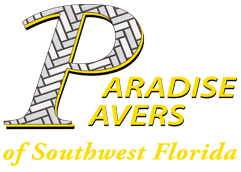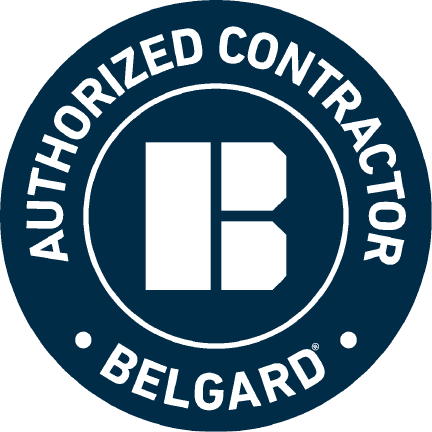Q: What type of services does your company provide?
Paradise Pavers of SWFL provides all services that would involve paver hardscape. We not only do full remodels for pools, patios, decks, and driveways, but also can build retaining walls, columns, outdoor kitchens, and fireplaces. We also do all paver maintenance work, such as repairs, cleaning, and sealing.
Q: Do you sell new or recycled pavers?
Paradise Pavers of SWFL does factory direct shipping on all orders. We also try to only order what is needed for each project and typically do not have a backstock. We also do not keep any removed pavers from projects. If you are interested in just purchasing Belgard pavers, we would be more than happy to provide you with the contact information for the local Belgard sales representative.
Q: What areas of Southwest Florida do you service?
Paradise Pavers of SWFL currently services the areas of Lee County, Sarasota County, residences zoned as the City of Punta Gorda, and Arcadia. We are not currently servicing residences zoned only as Charlotte County or Collier County.
Q: How do I get an estimate and what is the cost?
Our estimate process is pretty simple. We ask our potential clients to have as much information as they can get, i.e. square footage of the project, information on existing pavers we would need to match (if applicable), pictures of the proposed area, or style/color of pavers wanted, to help expedite the estimate process. If you have the information mentioned above, our staff would be able to give you a rough estimate over the phone. We also schedule in person consultations, but those appointments could be up to a week out. Our estimate appointments are Tuesday – Thursday in one hour windows from 10 AM – 3 PM. You do not have to be home for an estimate, as long as we are able to access the area you would like the project to be done at. All our estimates are at no charge. All estimates are only valid for 30 days.
Q: What different paver types are available and what are the pros and cons to each?
There are four major types of pavers that we can use for a project:
- Standard/Concrete Pavers: The most common type of paver and industry standard would be traditional concrete pavers. These pavers come in a variety of thicknesses as well as colors and styles. This type of paver is usually the most cost effective but would tend to require bi-yearly maintenance, i.e. clean and sealing.
- Travertine Pavers: Travertine pavers are those that are made out of natural stone. They tend to offer unique patterns and marbling and are a bit more durable than traditional concrete pavers. They are typically easier to clean, especially if sealed, and age better over time. The cons to travertine would be that each piece is unique, so harder to match if you need to repair broken pieces and it is about twice as expensive as concrete pavers
- Porcelain Pavers: Porcelain pavers are the top of the line paver product. While coming in many unique finishes, they are also one of the most durable pavers you can get. They are non-porous so they do not absorb stains and are extremely easy to clean and maintain. The only true con to this type of paver is the cost. Porcelain pavers require different types of blade to cut and install and are just overall more expensive to purchase from the manufacturer. Porcelain pavers run about 3x the amount of traditional pavers, but do not require as much maintenance, if any, compared to the other material options.
- Pervious Pavers: Pervious pavers are only recommended if your project will exceed an impervious limit set by your local municipality or if you are having a lot of water drainage problems. Pervious pavers allow water to naturally seep through and go down to the soil underneath instead of being hindered or stopped like traditional concrete pavers do. These pavers are typically required for the coastal areas of SWFL. Since these pavers have to be specially manufactured, they do tend to be a little more expensive than their concrete counterparts. They also usually do not come in a lot of sizes or colors.
Q: Does your company have a formal contract?
Yes! All of our major projects and bigger repairs do require a contract. All contracts do require an in person consultation before being prepared. We are able to do contract signing both in person or through Docusign.
Q: How much of a deposit is required and what payment methods do you accept?
For almost all projects, a 50% deposit is required. For any project over $8,000, we break up the remaining balance into two payments. The first payment, called a “Start-Draw” payment, is 25% of the original total or 50% of the remaining balance and is due at the start of the installation process. The remaining balance is due at completion of the project. We accept cash, check, ACH bank transfers, and credit card payments. There is a 3% transaction fee for all credit card payments. We do consider alternative payment arrangements if needed.
Q: Does your company pull necessary permits and what all is required to do so?
Yes! Paradise Pavers of SWFL would pull all necessary permits for your project and schedule all inspections needed. What is required for said permits varies from municipality to municipality as well as project type:
- City of Punta Gorda: Pool Deck/Patio remodels do not require a permit as long as no extensions to the existing pool deck are being made. Any new projections in the rear of the home or walkways require a zoning permit and would require the homeowner to provide us with a copy of a survey. All driveway remodels will require a permit as well as a few additional items. Driveways in the City of Punta Gorda require a boxed culvert, if you do not already have one. Also, the survey needed for this project would need to be one year or newer, since it is a building permit. All permitted projects require a Notice of Commencement that would need to be filled out by the homeowner and notarized.
- City of Cape Coral: Pool Deck/Patio remodels do not require a permit as long as no extensions to the existing pool deck are being made, all other projects do require a permit. Surveys are required for all projects and we are able to fill out all the additional permit paperwork as needed. A Notice of Commencement is required for all permitted projects.
- Lee County: Pool Deck/Patio remodels do not require a permit as long as no extensions to the existing pool deck are being made. If you are located in a private gated community within Lee County, you do not need a permit for any project and project approval would be subject to your HoA. We do assist with all documentation needed for HoA applications. If your residence is not in a private community, a permit would be required. A survey may be required as well as a notarized Notice of Commencement.
Q: My municipality has an impervious limit, what does this mean?
A: Impervious limits refer to the amount of permanent, unmoveable (impervious), material you have on your property. Each municipality has a different maximum limit amount. For example, the City of Cape Coral has a limit of 60%, while barrier islands like Sanibel have variable limits depending where on the island you are located ranging from 20% to 0%. To calculate your existing impervious limit, you use the calculation below:
Total square footage of impervious structures / Square footage of Total Lot Area
If you find that your current or projected impervious area is above the limit allowed, you could consider doing your paver project in pervious pavers. Pervious pavers are designed to allow water to flow through them and do not count towards your impervious limit. Other factors that may affect your project include green space and vegetation ordinances. We encourage all clients to research any of these local ordinances before contacting for an estimate.
Q: Do you need a license to install pavers?
Although every city and county differ in their licensure requirements, most all municipalities require some form of occupational/certificate of competency license. You can validate a contractors license by simply looking online at Florida DBPR or your local municipality website. If you hire an “unlicensed” contractor, you can be in legal jeopardy as well.
Q: What do pavers cost per sq. Ft. To be installed?
This is a grey area: not all pavers are created equal, not every job or location is the same, nor does every business have the same overhead. At Paradise Pavers, we use THE finest materials available as well as hire THE best craftsman to provide a seamless project.
Q: Can I install 1” thick pavers over my driveway?
While there are materials out there that say they will bond the paver to the concrete, simply put 1” pavers are not engineered and manufactured for vehicular traffic. 1” pavers work great for what they were made for, over structurally sound concrete that is not compromised with cracks and sinking or heaved and in a pedestrian application i.e. pools, Lanai’s, walkways.
Q: Does your company do paver overlays?
Yes and no. Paradise Pavers of SWFL will only do overlays on existing pool decks and patio areas. We do not install paver overlays on driveways. Even though many paver manufacturers make products that are meant to be used as overlays for driveways, our owner does not feel that this is the best for the customer. Thinner pavers are not constructed to withstand the constant weight nor constant traffic of vehicles and will either shift or crack no matter what. We find to get the best paver driveway, it does need to be with the thicker pavers that would sit on their own base. Many customers try overlays because they feel it will be more cost efficient, but the price to do a complete remodel or an overlay is really not that much different.
Q: Should I seal my pavers and when?
In our harsh Southwest Florida climate, it is imperative that pavers be sealed. Pavers are subjected to extreme acid rain that will degrade the finished surface exposing the aggregate. UV rays from the sun will greatly diminish the color, so sealer acts as a sunscreen. Pavers are extremely porous and if something is spilled, i.e. oils, grease, or red wine, it will permanently stain them and replacement pavers unless the original die lot will not match. Pavers can be sealed immediately upon installation as long as the proper sealer is used. It’s an old wives tale to wait for a specified period before they are sealed.
Q: What type of paver sealer does Paradise Pavers of SWFL use?
At Paradise Pavers we use a 2 part polymeric-acrylic water based permeable sealer that penetrates the entire paver. Other options for sealer products only form a mere “film” at the surface which will trap wicked up moisture and occlude the paver. When this type of sealer degrades it can become blotchy and start to flake off. There is a vast difference in available sealer products that greatly change in pricing. We have personally seen entire projects ruined by improper sealer and application and only use what we believe to be the best so this does not happen to our clients.
Get A Free Estimate
Call us today at (239) 590-8249
Transform your outdoor spaces into a personalized paradise with Paradise Pavers – Florida’s premier paver installation experts with over 30 years of experience.





